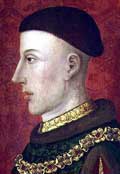| The eldest son of Henry Earl of Derby, young Henry was created Prince of Wales after his father acceded to the throne of England as King Henry IV. Prince Henry gained his first war experience in 1403 when he commanded the troops against the Welsh rebels. By the end of his father's life, Henry acquired a strong influence in the king's Council, but his disagreements with the ailing king resulted in his discharge. Henry succeeded his father on 20 Mar 1413 and soon faced an abortive Lollard rising (1414) and a conspiracy (1415) in favor of the Earl of March. Not content with the lands ceded by the French at the Treaty of Calais (1360), Henry prepared for a long war laying claim to Normandy, Touraine, Maine and other territories. Having appointed his brother, John duke of Bedford, as lieutenant of the kingdom (11 Aug 1415), Henry invaded France and won a brilliant victory at Agincourt (25 Oct 1415). He returned to England in triumph and made a treaty of alliance with the Holy Roman Emperor Sigismund (1416). In 1417 Bedford was again entrusted with the lieutenancy and the war was renewed on a larger scale. Henry's armies occupied Lower Normandy and advanced to Rouen, which capitulated in January 1419. The murder of Jean Duke of Burgundy by the partisans of Dauphin Charles (later King Charles VII), helped Henry build the Anglo-Burgundian alliance. Unable to organize resistance to the English invaders, the French court and mentally deranged King Charles VI agreed to sign the Treaty of Troyes (21 May 1420), in which Henry V was recognized "heir and regent" of France. Henry also married Charles VI's daughter Catherine (2 Jun 1420), but the Dauphin opposed the treaty, which deprived him of his hereditary right, and the war continued. In 1422 Henry V contracted dysentery and died at the siege of Meaux. [2; 3] |
| [1] |
There is no absolute certainty about the date of Henry's birth, although either 9 August or 16 September always features. The year, however, remains unresolved: was it 1386 or 1387. The uncertainty stems from the different ways of expressing it chosen by writers of the time: (a) a clear date, e.g., 16 Sep 1386 (John Rylands, University of Manchester Library, French Ms 54); (b) Henry is said to have been in his 26th year (i.e. he was 25 years old) when he was crowned on 9 Apr 1413 ("Titi Livii Foro-Juliensis Vita Henrici Quinti Regis Angliae", ed. T. Hearne, Oxford, 1716, p. 5); (c) Henry's death on 31 Aug 1422 occurred in a particular year of his life - e.g. in the 36th year of his age - i.e. he was 35 years old ("First English Life of King Henry the Fifth", ed. C.L. Kingsford, Oxford, 1911, p.182). If he was born on 9 August, this gives the year as 1387, if on 16 September (the feast of St Edith, as some contemporaries pointed out), Henry must have been born in 1386. See C.L. Kingsford, 'The early biographies of Henry V', English Historical Review 25 (1910), 62; (d) writing in 1896, J.H. Wylie chose August 1386 ("History of England under Henry the Fourth", 4 vols, London, 1884-98, iii, 323-4). W.T. Waugh, author with Wylie of "The reign of Henry the Fifth" (3 vols, Cambridge, 1914-29, iii, 427), claimed 16 September 1387 as 'correct'. |

